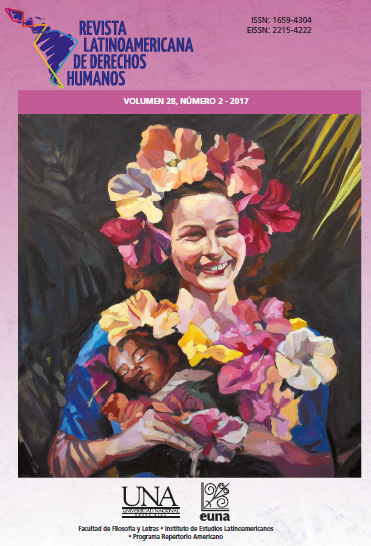The Social and Local Construction of Human Rights. Reflections from the Perspective of the Right to Education in Mexico
DOI:
https://doi.org/10.15359/rldh.28-2.2Keywords:
human rights, right to education, public policy, social-local constructionAbstract
The present article constitutes a critical reflection on human rights from the social-legal field in Mexico. Its purpose is to provide a discussion on a current legal and institutional reality, that is, the right to education in human rights based on one of the most important constitutional reforms in recent years in the field of human rights: the reform of June 2011. This reform, by the article 1° and 3° of the Constitution, introduced a public policy (proposed to the National Development Plan 2013-2018, along with the National Human Rights Program 2014-2018 within the federal public administration) whose object is to implement the teaching of human rights at the national level. In this proposal, we observe two effects, one positive and one negative, inscribed only in the institutional or official dimension of the Mexican State, from which is derived a third positive effect for the social or local sphere, that is to say, for the space where the popular sectors or cultural minorities live. Therefore, it is in this social or local sphere where the third positive effect of the national public policy would take place to rethink the counter-hegemonic and alternative use of the right to education in human rights, from where would be possible the social-local construction or reconstruction of human rights that the present and future society requires with some urgency.
References
Castillo Morga, A. (2009). Nuevos derechos humanos como conquistas históricas de los excluidos. Revista de Derechos Humanos y Estudios Sociales REDHES, (2), 77-116. Recuperado de http://www.derecho.uaslp.mx/Documents/Revista%20REDHES/N%C3%BAmero%202/Redhes2-04.pdf
Cátedra UNESCO de Derechos Humanos de la UNAM. (2017). Presentación. Recuperado de http://catedradh.unesco.unam.mx/
Constitución Política de los Estados Unidos Mexicanos [Const.] (1917). [Reformada], DOF. Recuperado de http://www.diputados.gob.mx/LeyesBiblio/pdf/1_240217.pdf
Engle Merry, S. (2006). Derechos humanos, género y nuevos movimientos sociales: Debates contemporáneos en antropología jurídica. En V. Chanaut, M. Gómez, H. Ortiz, & M.T. Sierra. (Coords.), Justicia y diversidad en América Latina. Pueblos indígenas ante la globalización (pp. 261-289). Ecuador: FLACSO ECUADOR-CIESAS. Recuperado de file:///C:/Users/pc/Downloads/LFLACSO-11-Engle.pdf
Gallardo, H. (2010). Teoría crítica y derechos humanos. Una lectura latinoamericana. Revista de Derechos Humanos y Estudios Sociales REDHES, (4), 57-89. Recuperado de http://www.derecho.uaslp.mx/Documents/Revista%20REDHES/N%C3%BAmero%204/Redhes4-03.pdf
Herrera Flores, J. (2003). Los derechos humanos en el contexto de la globalización: Tres precisiones conceptuales. En Derechos humanos y orden global: Tres desafíos teórico-políticos. Coímbra: Coloquio internacional -Dereito e Justica no Século XXI.
Herrera Flores, J. (2004). Derechos humanos, interculturalidad y racionalidad de resistencia. DIKAIOSYNE Revista de Filosofía Práctica, (12), 39-58. Recuperado de https://roxanarodriguezortiz.files.wordpress.com/2014/12/3-ddhh-interculturalidad-y-racionalidad-resistencia-joaquc3adn-herrera-flores.pdf
Herrera Flores, J. (2008). La reinvención de los derechos humanos. Andalucía: Atrapasueños-Colección Ensayando.
Iud, A. (2005). Entrevista a Boaventura de Sousa Santos: Hay que politizar la formación, crear otro compromiso social en las facultades de derecho. Revista Sistemas Judiciales -Abogacía y Educación Legal-, (9), 52-61. Recuperado de http://www.sistemasjudiciales.org/content/jud/archivos/revpdf/35.pdf
Latapí, P. (2009). El derecho a la educación. Su alcance, exigibilidad y relevancia para la política educativa. Revista Mexicana de Investigación Educativa, 14(40), 255-287. Recuperado de http://www.redalyc.org/articulo.oa?id=14004012
Padierna Jiménez, M.P. (2010). Educación y movimientos sociales. PAMPEDIA-Artículos, Revista de las Facultades de Pedagogía de la Universidad Veracruzana, (6), 13-27. Recuperado de https://www.uv.mx/pampedia/numeros/numero-6/educacion-mov-sociales.pdf
Piña Jiménez, I. (2010). Políticas educativas en Iberoamérica. Revista de la Educación Superior, 39(155), 139-144. Recuperado de http://www.redalyc.org/articulo.oa?id=60418902008
Plan Nacional de Desarrollo 2013-2018. (2013). Recuperado de http://pnd.gob.mx/
Programa Nacional de Derechos Humanos 2014-2018, (2014). Recuperado de http://www.gobernacion.gob.mx/es_mx/SEGOB/Programa_Nacional_de_Derechos_Humanos
Rangel, J. (2006). El derecho como arma de liberación en América Latina. Sociología jurídica y uso alternativo del derecho. México: Centro de Estudios Jurídicos y Sociales-Facultad de Derecho de la Universidad Autónoma de San Luis Potosí.
Rangel, J. (2012). El derecho que sigue naciendo del pueblo. Movimientos sociales y pluralismo jurídico. México: Universidad Autónoma de Aguascalientes-Ediciones Coyoacán.
Rangel, J. A. (2006). Hermenéutica analógica, justicia y uso alternativo del derecho. Epikepia, Revista de Derecho y Política, (3), 1-24. Recuperado de http://epikeia.leon.uia.mx/old/numeros/03/epikeia03-hermeneutica_analogica.pdf
Sánchez Rubio, D. (2010). Desafíos contemporáneos del derecho: Diversidad, complejidad y derechos humanos. Revista del Instituto de Investigaciones Jurídicas, (1), 9-31. Recuperado de https://www.uaeh.edu.mx/investigacion/icshu/LI_DerFunda/Gro_Martha/RIIJ2010.pdf
Santos, B. (2002). Hacia una concepción multicultural de los derechos humanos. En El otro derecho. Bogotá: ILSA.
Santos, B. (2007). El foro social mundial y el auto-aprendizaje: La Universidad Popular de los Movimientos Sociales. Revista Theomai, (15), 101-106. Recuperado de http://www.redalyc.org/articulo.oa?id=12401510
Santos, B. (2009). Sociología jurídica crítica. Para un nuevo sentido común en el derecho. España: Trotta.
Santos, B. (2010a). Refundación del Estado en América Latina, Perspectivas desde una epistemología del Sur. Perú: IIDS-Programa Democracia y Transformación Global.
Santos, B. (2010b). Descolonizar el saber, reinventar el poder. Uruguay: TRILCE-Extensión Universitaria-Universidad de la República.
Santos, B. (2011). Introducción: Las epistemologías del sur. En Formas-Otras. Saber, nombrar, narrar, hacer, IV Training Seminar de jóvenes investigadores en dinámicas interculturales. Barcelona: CIDOB Colección Monografías, 11-22. Recuperado de file:///C:/Users/pc/Downloads/MONOGRAFIA%20DOCTORANDOS%202011_web.pdf
Wolkmer, A. C. & Batista, A. C. (2010). Derechos humanos, interculturalidad y educación popular. Revista de Derechos Humanos y Estudios Sociales REDHES, (4), 129-146. Recuperado de http://www.derecho.uaslp.mx/Documents/Revista%20REDHES/N%C3%BAmero%204/Redhes4-06.pdf
Downloads
Published
How to Cite
Issue
Section
License
El material que se publica en esta Revista está bajo una licencia “Creative Commons” 3.0 Costa Rica (CC, Reconocimiento-NoComercial-SinObraDerivada 3.0 Costa Rica (CC BY-NC-ND 3.0 CR) . Esto significa que el material publicado en la revista se puede compartir (copiar y distribuir) en cualquier medio o formato considerando que se debe reconocer de forma adecuada la autoría del material y la fuente, no puede utilizarse con fines comerciales y no se aceptan las obras derivadas (remezclar, transformar o crear a partir del material).








